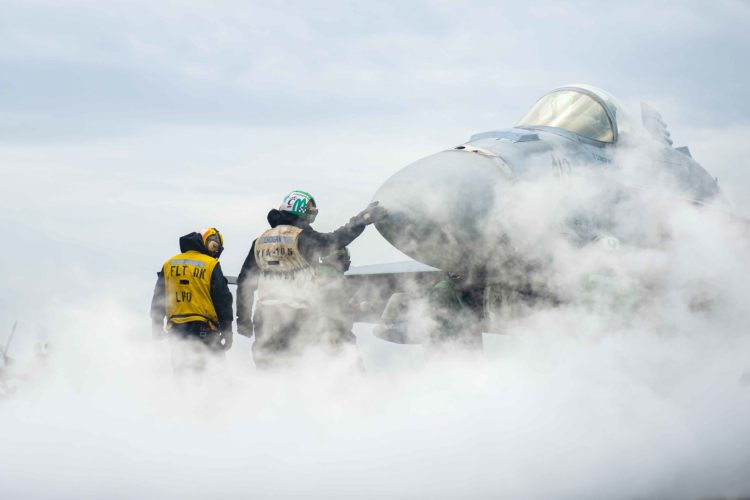These acts of Iranian aggression were responded to with a demonstration of strength from the U.S. and Israel. Eight Israeli F-15 Eagles and two U.S. Air Force B-52H Stratofortresses flew together in formation in Israeli airspace, delivering an unspoken message. Meanwhile, USCENTCOM put out a press release stating that the goal was to “deter aggression and reassure partners and allies of the U.S. military’s commitment to security in the region.”
During normal, peaceful times, an Israeli-American cooperative exercise might not be that unusual or significant. But the press release made it a point to mention that “multiple partner nations and U.S. Air Force fighter aircraft accompanied the U.S. bombers at different points during the flight, including Israel, Saudi Arabia, and Qatar.” Besides the obvious strengthening of aerial coordination, the cooperation between the U.S., Israel, and their Gulf allies in the sharing of intelligence and access to airfields is a potential game-changer in deterring further Iranian aggression.
As the U.S. considers a return to the Joint Comprehensive Plan of Action (JCPOA), also known as the Iran nuclear deal, Iran has been ramping up its nuclear program in an attempt to pressure the new administration into a favorable agreement. While hardly a crisis or a definitive harbinger of hostilities to come, there are troubling signs that a regional war could lie ahead. In case its resolve falters or the U.S. chooses to avoid engaging, the Gulf nations and Israel are taking no chances.
Israeli Defense Minister Benny Gantz recently announced that Israel plans to develop a “special security arrangement” with its new allies, telling Reuters, “we are going to develop defense relations with every country that we have relations with.”
Former Iranian Defense Minister Gen. Ahmad Vahidi has threatened consequences for any such agreements, saying to Saudi Arabia, Bahrain, and the U.A.E. that “joining such an alliance would bring catastrophic consequences upon them.” Yet in a battle against Iran, Israel may be calculating that joint action with like-minded Arab nations could be its best option.
The Abraham Accords included an agreement for the sale of up to 50 F-35s and up to 18 MQ-9s to the U.A.E., something that Israel approves. This provision is currently under review by the Biden Administration.
That Israel would coordinate regional security with the U.A.E. and Bahrain is logical. Yet, the idea that Qatar and Israel are now cooperating militarily is nothing short of incredible. In 2009, the two countries broke off diplomatic relations after their relationship had grown strained. Israel had since harshly criticized Qatar for providing funding for Hamas and sponsoring terrorism. But their military collaboration indicates how seriously both countries must be taking the Iranian threat.
In all likelihood, a conflict between these various players and Iran would end up embroiling the United States, with a very real possibility of American military personnel being deployed to the Middle East yet again. But next time could entail battling alongside Israelis, Qataris, Saudis, and Emiratis.
With the region heating up and tensions building, hostilities in the Middle East do not appear likely to die down anytime soon. On the contrary, expect heightened rhetoric, sporadic jockeying, and skirmishes, especially as America debates a possible return to the Iran nuclear deal and the Islamic regime seeks to gain leverage.
At the end of the day, if America’s allies — especially Israel — decide that the only way to halt Iran is through military might then the U.S. will almost certainly be drawn into the fighting in some fashion, even if this entails intelligence-sharing or other behind-the-scenes activity.
Should a conflict erupt, then America will confront a familiar enemy alongside a new cadre of nations whose common cause against Iran has turned them from adversaries into allies.
This article was written by Evan Nierman. Evan is the Founder and CEO of the international communications firm Red Banyan.










COMMENTS